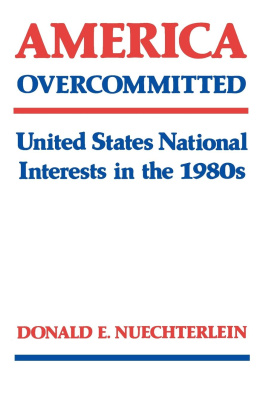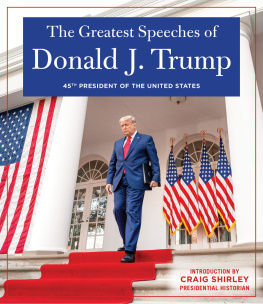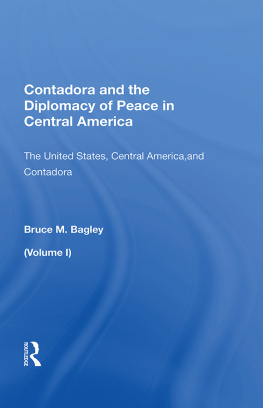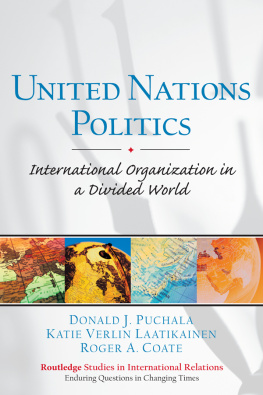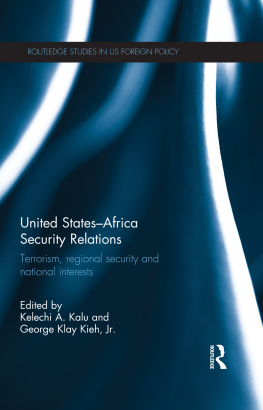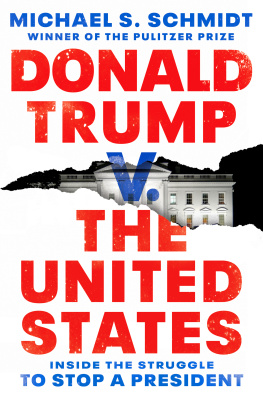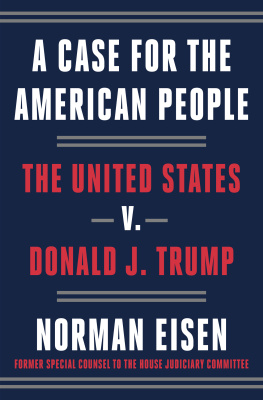Copyright 1985 by The University Press of Kentucky
Scholarly publisher for the Commonwealth, serving Bellarmine College, Berea College, Centre College of Kentucky, Eastern Kentucky University The Filson Club, Georgetown College, Kentucky Historical Society, Kentucky State University
Morehead State University, Murray State University, Northern Kentucky University, Transylvania University, University of Kentucky, University of Louisville, and Western Kentucky University.
Editorial and Sales Offices: Lexington, Kentucky 40506-0024
Library of Congress Cataloging in Publication Data
Nuechterlein, Donald Edwin, 1925-
America overcommitted.
Includes index.
1. United StatesForeign relations1981- 2. United StatesNational security. I. Title.
E876.N84 1985 327.73 84-17409
ISBN: 978-0-8131-5413-8
Preface
This book deals with the foreign policy priorities of the United States as it enters the latter half of the 1980s and contemplates its role in the world during the 1990s. The title America Overcommitted was suggested by an article I contributed to the Foreign Service Journal in 1982, which concluded with this statement: Whether the United States remains a super-power into the 21st century depends in large measure on how it decides its international priorities in this decade and marshals its resources to defend them. Reducing the range and the cost of worldwide U.S. commitments is long overdue, and the Reagan Administration should not flinch from making the hard decisions to do so. This theme was elaborated in a paper entitled National Interests and National Strategy: The Need for Priority that I presented to the National Security Affairs Conference of the National Defense University in October 1982. That paper came to the attention of the University Press of Kentucky, which had published my previous volume on U.S. national interests, and we agreed that it would make a provocative book.
This volume is the fourth effort that I have made to develop and broaden a conceptual framework for defining U.S. national interests in the contemporary world. The first was United States National Interests in a Changing World (University Press of Kentucky, 1973); the second was National Interests and Presidential Leadership: The Setting of Priorities (Westview Press, 1978); the third was my contribution to a 1981 publication of the Woodrow Wilson International Center for Scholars, entitled The National Interests of the United States in Foreign Policy. This study is the first, however, that analyzes U.S. interests and policies on a worldwide scale.
Several things need to be stated at the outset. First, this is a policy oriented work and it deals with major issues in U.S. foreign and national security policy rather than with the theory of international politics, decision theory, or the morality of American foreign policy. Second, it is urgently concerned with establishing priorities among the vast number of U.S. defense commitments and responsibilities around the globe. It is simply not going to be feasible, in my view, for the United States to pay the costs of all its forces currently stationed abroad while taking on new responsibilities in the Middle East, the Indian Ocean, and Central America. Hard choices among Europe, Northeast Asia, the Indian Ocean, and the Caribbean Basin will therefore have to be made in terms of manpower, economic resources, and military and economic assistance programs if the United States is to remain financially strong and emotionally committed to an international rather than an isolationist foreign policy. Third, this study assumes the rational-actor model for deciding what interests and policies the United States should pursue in the world, and it accepts the view that the President has the primary, although not exclusive, constitutional authority to determine the national interests of the United States and propose the policies needed to defend them. Fourth, although the study deals with policy issues and is aimed at a large audience of opinion leaders as well as serious students of international affairs, it includes a conceptual framework for analyzing policy choices that should prove helpful also to the general reader in sorting out his/her own priorities about the importance of specific regions of the world and the appropriate policies to pursue in them. Finally, this study represents my own viewsnot those of policy-makers, scholars or military plannersas to what U.S. national interests and policies ought to be in the 1980s and 1990s. In some cases I agree with official policy and in others I do not; but the important point is that readers should be able to make up their own minds about the U.S. stake in the world, not simply on the basis of the opinions and judgments contained herein but by the use of the conceptual framework suggested in for establishing international priorities.
The book is divided into three rather distinct parts. are my effort to establish worldwide priorities among U.S. national interests and policies and to review the Reagan administrations handling of U.S. priorities during its first three years in office.
This is an ambitious undertaking. I know of no other scholar who has attempted it recently. The book will not satisfy those who think that national interest is too imprecise a way to analyze foreign policy issues and international relations. It may not appeal to those who believe that American foreign policy since World War II has been misguided on ideological grounds or corrupted by unwarranted confidence in the efficacy of military instruments of power. But it should attract those who believe, as I do, that wiser choices can be made by political leaders if they decide to be more systematic in the way they assess U.S. interests and policies. I also believe that their task will be easier if we have an informed American public that appreciates the need for priorities and is willing to accept the hard choices that policy-makers must face. I do not pretend to be the leading authority in this process of getting the ends and means of U.S. foreign policy into alignment, but I do bring to the debate some forty years of experience in government and academia, the last fourteen of which have been devoted to finding a more rigorous way of getting the priorities right. I hope that this new volume will add to my earlier efforts to clarify the issues and that it will stimulate others to enter the arena.
Charlottesville, Virginia
June 1984
Foreign Service Journal, March 1982, p. 30
1. National Interest as a Basis of Foreign Policy Formulation
The term national interest has long been used by statesmen and scholars to describe the foreign policy goals of nation-states. Although the concept is not new there is ambiguity about its meaning, and most scholars have chosen to use their own descriptions rather than follow formulations offered by others. Today the student of international relations finds numerous definitions of national interest, most of which are not conducive to precision in the making of foreign policy. Before attempting a more adequate definition, however, it is useful to review briefly what major American writers have said about the nature and roots of the nations interests, particularly those writing after the United States became a great power.


